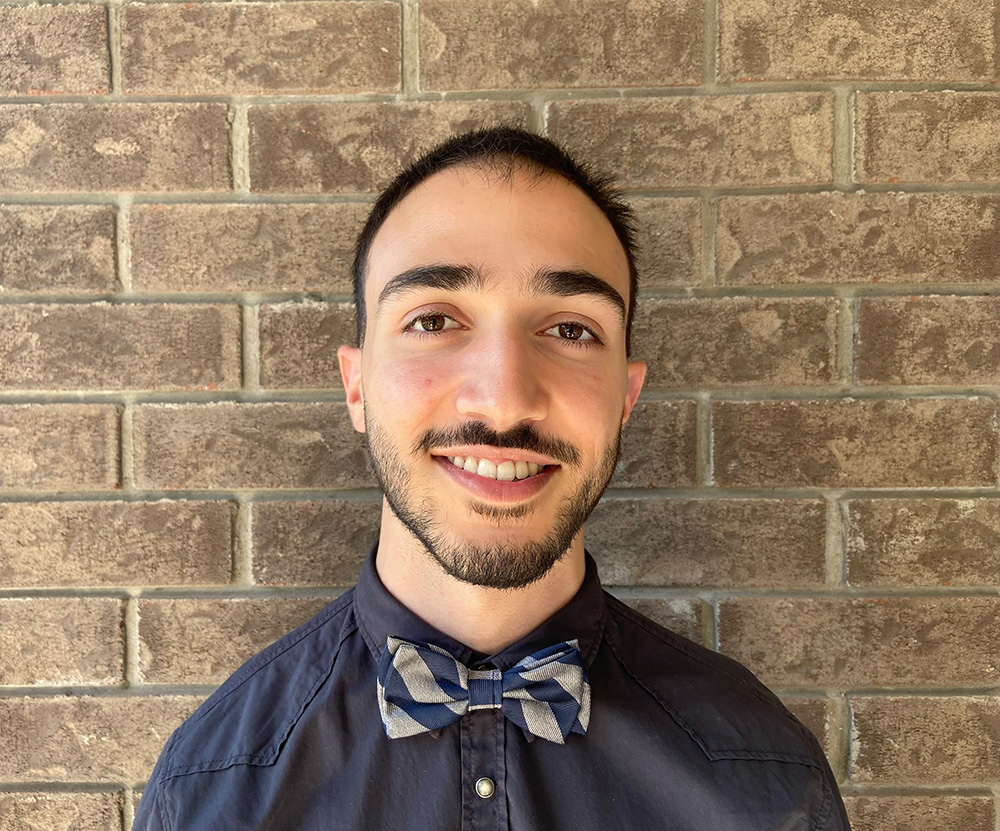Arts students, Kamron Zahedi and Arianna Guaragna, win Global Undergraduate Awards
The Global Undergraduate Awards (external link) is the world's leading academic awards programme which recognizes top undergraduate work, shares this work with a global audience and connects students across cultures and disciplines. Arianna Guaranga’s paper received the Highly Commended designation, which ranked in the top 10 per cent of all submissions in their category. Kamron’s paper was the regional winner for Canada and the United States.

Kamron Zahedi
Kamron graduated with a BA in Criminology with a minor in law at TMU and also dedicated much of his time to volunteering in the social services. He currently works at the John Howard Society of Toronto and plans on pursuing postgraduate studies in social work or a similar field. Besides reading and exercising, Kamron plans to get started on an autobiographical book that will deal with societal as well as global issues from a postmodernist lens with insight from his own experiences as a second-generation immigrant in Canada. In his personal time, he enjoys studying French, listening to francophone songs, and spending quality time with his family.
What is your paper about?
My paper is about Canada’s exploitation of natural resources in Colombia and its role in causing ecologically-induced genocide amongst its rural populations, especially Indigenous and Afro-Colombians.
By taking an eco-centric approach, I analyzed the large-scale mining operations of two Canadian corporations with active operations in Colombia. I found that these corporations engage in human rights violations, flout labour and environmental laws, propagate smear campaigns, and extract Colombia’s natural resources to maximize their bottom dollar in Canada. However since these atrocities do not exactly qualify as genocide or crimes against humanity, the best alternative is to add ecocide, as espoused by Scottish lawyer Polly Higgins, to the Rome Statute so that such corporations can be prosecuted and denounced for their environmentally abusive behaviours. Of course, I acknowledge that adding ecocide to the International Criminal Court would not put a stop to all environmental atrocities, but it would certainly mark a shift in global culture towards land conservation and the equitable distribution of resources.
What influenced your paper?
During my seminar course in Criminology, Professor Joshua Price recommended The Dispossessed by Alfredo Molano which went into great detail about the lived experiences of rural Colombians who suffered at the hands of paramilitaries and rebel groups who constantly fought over pieces of land. I came up with a motivated question in class which asked: Why is there a global trend of rural dwellers moving into urban centres? As I researched the subject, I came to the conclusion that rural dwellers are being forcibly displaced by economic, political, and environmental factors pertaining to the extraction of natural resources on the contested territories.
I was also inspired by a CSR Institute seminar hosted by Professor Kernaghan Webb which encouraged sustainable development goals and ensuring corporations are socially responsible in their operations. My paper is multidisciplinary, and that is probably what I love most about it. I made connections to criminology, geography, philosophy, law, international relations, and other fields that are important to me, and managed to combine it all into one stellar paper!
What does your work mean to you?
I am extremely proud of my work because it sheds light on the fact that developed countries like Canada enrich themselves off the backs of poor labourers in developing countries like Colombia.
This paper means a lot to me, especially since I even included the implications of such environmental atrocities domestically as well as abroad. In my concluding remarks, I mentioned the Greenbelt controversy in Ontario, the risks of deep-sea mining operations, and the boil-water advisories in Indigenous communities across Canada.
All these issues involve environmental violence, and they all have implications for humanity which will manifest sooner or later. By including these emerging issues in my paper about crimes against nature, I added an element of contemporariness to my paper to make it more relevant in our time period. I must say that winning an award for this work really solidifies my pride in writing this paper, and it recognizes the amount of research and passion I invested into it. I feel encouraged to continue my passion for researching and writing about issues of global importance.

Arianna Guaragna
Arianna Guaragna is a recent graduate of the English program at Toronto Metropolitan University. Having completed her BA in English and minor in Philosophy, she is now pursuing graduate studies at the University of Toronto in the English MA Program, including a Collaborative Specialization in Diaspora and Transnational Studies. Her primary research interests are in feminist, postcolonial and decolonial literature, life-writing, memory and fragmentation, diasporic narratives, and psychology.
What is your paper about?
Rawi Hage’s Cockroach is a psychological labyrinth portraying the Canadian immigrant’s most intimate thoughts and feelings while navigating the cold and unforgiving terrain of a self-proclaimed altruistic nation. Scholars Brittany Kraus and Lisa Marchi dissect Hage’s novel by interrogating the experiences of the abject immigrant as a pestilent creature capable of traversing material and immaterial spaces.
The intricacies of Kraus and Marchi’s work can be further developed through a Foucauldian analysis which reveals how the subversion of power dynamics unravels through the titular protagonist and his therapist as they participate in reciprocal panoptical gazing. In reading the Canadian state as a panoptical subject for which the racialized immigrant exists as the object of its piercing and punitive gaze, the novel evidences the state’s internalized suspicion of the immigrant other. The protagonist’s elusive shifting between human and cockroach form can thus be understood as a survival mechanism and means for traversing liminal spaces outside the state’s forceful surveillance.
What inspired your work?
In my fourth year at TMU, I wrote a paper entitled Dancing of the Cockroach: Performance, Subversion, and Inverting the Gaze based on the novel Cockroach (2008) by the Lebanese-Canadian writer Rawi Hage. The paper was written for the course Special Topics in Canadian Literature, where we were thinking through and problematizing which kinds of literature are traditionally accepted into the canon of “Canadian Lit.”
I was drawn to Hage’s novel for its subversiveness and layered storytelling. Hage’s protagonist fiercely pierces through the veil of Canadian benevolence and elucidates the contradictions and tensions that emerge in his immigrant community in Montréal. Working through this paper led me to think about how people perform under surveillance as a survival tactic and a mode of resistance. In utilizing a Foucauldian analysis, I wanted to explore the relationship between the Canadian state and those within its borders and how surveillance becomes a mechanism for training the ‘ideal’ and ‘good’ citizens.
What does this work mean to you?
The idea for this paper first took form in a series of incoherent sticky notes and eventually materialized into an analytical essay. My passion for the novel and its potential analysis guided the research and writing process. My decision to submit this paper to the Global Undergraduate Awards was informed by a resounding “What if?” The work of young academics is to muster enough faith to take chances, with the outcome sometimes being rejection, other times being successful, and always an opportunity for learning and growth.
I am extremely honoured to have been selected amongst the Highly Commended in the Literature category for the 2023 Global Undergraduate Awards Programme. I am grateful for the faculty that shaped my undergraduate experience and challenged me in my studies, and for TMU for encouraging its students to nominate their work, and for, importantly, asking “What if?”.